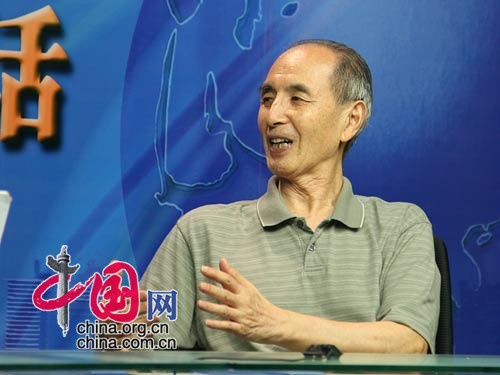
China.org.cn: We know that you have a good personal relationship with Israel Epstein, the famous international journalist. Would you like to talk about him?
Lin Wusun: I have had a lot of help from foreign experts and foreign colleagues during my career. I feel an immense gratitude to them.
Epstein is one of them. He was not only a journalist, but also a scholar. He told me that he didn't attend university. He had to stay at home because of a leg injury, and he used to read Encyclopedia Britannica. Making full use of any time available to study is always worthwhile.
Epstein was dedicated. In the course of 30 years he visited Tibet four times and he wrote a very famous book called Tibet Transformed. He systematically took notes and kept them all, from which I learned a great deal.
He was optimistic and kind. No matter what he was asked by young men, he answered seriously. His wealth of experience and knowledge in the fields of publishing and communication were a great help to me.
China.org.cn: You have stressed on many occasions that a detailed knowledge of Chinese is of vital importance to a Chinese speaking translator. Why do you think so?
Lin Wusun: When lecturing in Nanjing in 2003 I told students that the first thing for a Chinese translator to do is to learn Chinese well. Audiences frequently raised such issues as: "I am afraid that I might forget my Chinese when learning English", or "What if I forgot my Chinese, and my English is not good enough?" Few foreign language students are skilled in Chinese, which is certain to influence their understanding of the original work when translating from Chinese to a foreign language. The converse would apply to someone translating into Chinese. Foreign language students should therefore give attention to their mother language. Speaking well is not the same as writing well.
I have found over the last 2-3 years that many foreign language study colleges also have classes in Chinese and traditional Chinese. Students are not only required to study traditional Chinese, but also traditional Chinese culture. Students must excel in both Chinese and foreign languages, and at the same time should work on the cultures of both countries.
China.org.cn: The 18th FIT World Congress, described as the Olympics of the translation world, is to open in Shanghai. What do you think of this conference and its theme – "translation and diversified culture"?
Lin Wusun: It was not easy to get the opportunity to hold this conference. China worked hard on its preparation after careful deliberation. We applied to host the conference as we believe we are capable of organizing it well. China won support from all the participants. This is an important conference, as the FIT World Congress has never been held in Asia. Most of the previous conferences were in Europe, apart the one in Australia in 1996. This time it will be in China, which proves that the translation world is changing and that the international status of China is improving as well.
This conference has a good theme, "translation and diversified culture". Global economic integration is bringing huge changes to the world, and countries and regions are becoming more homogenized. Shanghai's economy boomed as it took advantage of this globalization. The significance of this conference is to present the world with the huge changes that have taken place in China.
One issue is that globalization brings not only economic expansion but also powerful cultural influences. Popular culture through media like movies and cartoons is flooding into developing countries. Being more influenced by foreign imports than their own culture, young people in China will be familiar with western pop singers, but not Beijing Opera. This applies not only to China but to the whole world. The United Nations Educational Scientific and Cultural Organization (UNESCO) promotes the need for a diverse world, and we should protect intangible cultural heritage.
Many species in nature become extinct, but never again should this happen to a culture. Cultures do not simply belong to a specific country, but are a treasure deposited in the long history of humanity. We need to make it a priority in every nation and region to protect, preserve and develop its own cultural characteristics. We need a world of integrated cultures, but not at the price of the disappearance of some.
Translation makes a great contribution to cultural protection. Other people know of our long history and regional characteristics through the translation of works into different languages. China's folk music tradition possesses endless variety, the performance of which in Vienna promotes the exchange of Chinese traditional culture with others.
The world we are living in should be one of great diversity. This also helps us understand and build friendship. If we all know each other the occurrence of war would be rare, and conflicts could be solved through discussion and other means. I could not agree more with the President of the International Federation of Translators: "Translation is like water and electricity – we never notice its existence, but we cannot survive without it."
I hope that more young people here today will join the vital world of translation, with its challenges and its rewards.
(China.org.cn by Ma Yujia and Hou Xiaoying, July 31, 2008)